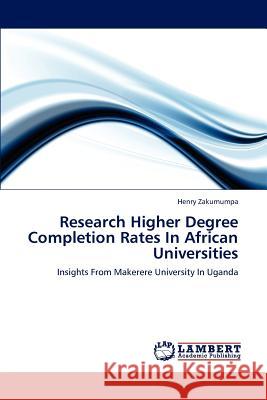Research Higher Degree Completion Rates in African Universities » książka
Research Higher Degree Completion Rates in African Universities
ISBN-13: 9783659206054 / Angielski / Miękka / 2012 / 104 str.
Research higher degree completion rates in African universities are relatively low. Most graduate research students complete their degrees outside the stipulated degree completion time. The study attempted an investigation of the underlying causes of this state of affairs using the case study of the oldest university in East and Central Africa, Makerere University. The study was guided by three themes; institutional factors, student-based factors and supervisor-related factors. The study findings suggest that the student research administration architecture is not supportive of timely completion. Delays in submission of external examiner reports, lack of steady study financing, student full-time employment and low research supervision capacity across graduate departments at Makerere University are some of the leading causes of low research degree completion rates. The study recommends an overhaul of the graduate research administration structure, increase in graduate scholarships and increased research supervision capacities and a diversification of graduate degree training formats.
Research higher degree completion rates in African universities are relatively low. Most graduate research students complete their degrees outside the stipulated degree completion time. The study attempted an investigation of the underlying causes of this state of affairs using the case study of the oldest university in East and Central Africa, Makerere University. The study was guided by three themes; institutional factors, student-based factors and supervisor-related factors. The study findings suggest that the student research administration architecture is not supportive of timely completion. Delays in submission of external examiner reports, lack of steady study financing, student full-time employment and low research supervision capacity across graduate departments at Makerere University are some of the leading causes of low research degree completion rates. The study recommends an overhaul of the graduate research administration structure, increase in graduate scholarships and increased research supervision capacities and a diversification of graduate degree training formats.











